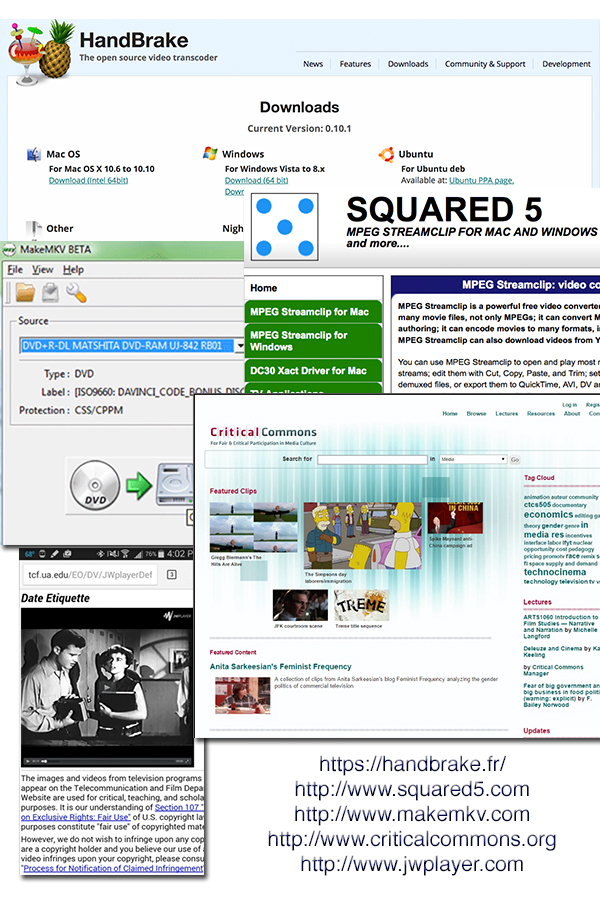Workshop at the Society for Cinema and Media Studies Annual Conference, Montreal, March 2015.
By Jeremy Butler, Kelli Marshall, Drew Morton, Matthew Thomas Payne and Benjamin Sampson
[ezcol_1half]
- Getting Video Off of DVDs/Bluray Discs/Video/YouTube: Preparing Video for Educational Use by Kelli Marshall [PDF]
- Making Your Own Video Essay (Handout) by Drew Morton [PDF]
- Making Your Own Video Essay (Talk) by Drew Morton [PDF]
- Video Essay Tips by Benjamin Sampson [PDF]
- Presenting Video Clips to Students by Jeremy Butler [PDF]
- Streaming (?) Full length Films and TV Shows: Licensing and Practical Issues by Matthew Thomas Payne [PDF]
The above resources have been shared by their authors under a Creative Commons License “Attribution-NonCommercial 4.0 International (CC BY-NC 4.0)” http://creativecommons.org/licenses/by-nc/4.0/
- Handbrake
- Squared 5 – MPEG Streamclip video converter for Mac & Windows
- MakeMKV
- Critical Commons
- JW Player (not free)
- Bellour, Raymond. (1975/2000). “The Unattainable Text.” Analysis of Film. Bloomington and Indianapolis: Indiana University Press: pp. 21-27.
- Faden, Eric. “A Manifesto for Critical Media.” Mediascape (Spring 2008).
- Keathley, Christian. 2011. “La Caméra-Stylo: Notes on Video Criticism and Cinephilia.” In The Language and Style of Film Criticism, ed. Alex Clayton and Andrew Klevan, 176-191. London: Routledge.
- Shephard, Kerry. “Questioning, promoting and evaluating the use of streaming video to support student learning.” British Journal of Educational Technology 34, no. 3 (2003): 295-308.
- SCMS Fair Use Policies, http://www.cmstudies.org/?page=fair_use
- Resources page at [in]Transition: Journal of Videographic Film and Moving Image Studies
- Anderson, Steven. 2012. “Fair Use and Media Studies in the Digital Age”, Frames Cinema Journal, 1.1. Online at: http://framescinemajournal.com/article/fair-use-and-media-studies-in-the-digital-age/
- Butler, Jeremy. 2011. “Clip-DVD Tutorial (Mac)”, Television: Critical Methods & Applications. Online at: http://tvcrit3.tvcrit.com/content/view/68/116/
- Center for Social Media and Impact’s Fair Use Information. Online at: http://www.cmsimpact.org/blog/fair-use
- CopyrightUser.org. 2014. Online at: http://copyrightuser.org/
- Mittell, Jason. 2012. “How to Rip DVD Clips.” Chronicle of Higher Education, August 12. Online at: http://chronicle.com/blogs/profhacker/how-to-rip-dvd-clips/26090
Useful Instructional/Informational Videos
- How to Rip a DVD with Handbrake (for Beginners): https://youtu.be/F_dw0NTVZiQ
- How to Rip a DVD using Handbrake & Windows 7(Updated): https://youtu.be/2wKIDpGTrRU
- Steve Anderson introduces Critical Commons during the lightning talk sessions of the Open Video Alliance conference: http://www.criticalcommons.org/Members/ccManager/clips/critical-commons-presentation-at-the-open-video
Biographical Notes
Jeremy Butler is a Professor of Telecommunication and Film at the University of Alabama. He has taught television, film, and new media courses since 1977–at Alabama, Northwestern University, and the University of Arizona He is the author of Television Style, Television: Critical Methods and Applications, and numerous articles on television and film.
Kelli Marshall teaches film and TV courses at DePaul University. When she’s not teaching or live-tweeting Scandal and The Walking Dead, Kelli researches two rather disparate fields: Shakespeare in film and popular culture, and the film musical, specifically the star image and work of Hollywood song-and-dance man Gene Kelly. Her work has appeared in The Week, Mental Floss, AlterNet, FlowTV, Literature/Film Quarterly, and other mainstream and academic publications. Follow Kelli on Twitter at @kellimarshall or contact her at kellimarshall.net.
Drew Morton is an Assistant Professor of Mass Communication at Texas A&M University-Texarkana. He the co-editor and co-founder of [in]Transition: Journal of Videographic Film and Moving Image Studies, the first peer-reviewed academic journal focused on the visual essay and all of its forms (co-presented by MediaCommons and Cinema Journal). His publications have appeared in animation: an interdisciplinary journal, Flow, In Media Res, the Journal of Graphic Novels and Comics, Mediascape, Press Play, RogerEbert.com, Senses of Cinema, Studies in Comics, and a range of academic anthologies. His manuscript on the overlap between American blockbuster cinema and comic book style is slated to be published by the University of Mississippi Press.
Matthew Thomas Payne is an Assistant Professor of Telecommunication and Film at the University of Alabama. He earned his PhD in Media Studies from the University of Texas at Austin and holds an MFA in Film Production from Boston University. Matthew is a co-editor of Flow TV: Television in the Age of Media Convergence, Joystick Soldiers: The Politics of Play in Military Video Games, and has work in Critical Studies in Media Communication and Games & Culture. Matthew is working on a monograph that examines the production, marketing, and reception of post-9/11 military “shooter” video games.
Benjamin Sampson is a PhD Candidate in Cinema and Media Studies at UCLA. His primary area of research explores the modern intersection between film institutions and religious culture. He also has a background in videographic production and contributes to the new field of visual essays. He has published several visual works and sits on the advisor board for Cinema Journal‘s new visual essay journal, [in]Transition.

